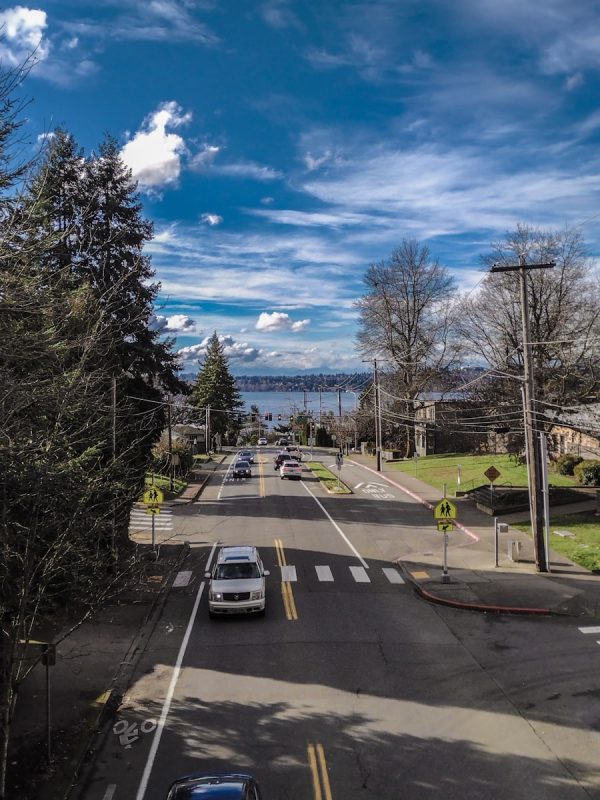The real estate market in Kirkland, Washington, has been steadily growing over the years. With its proximity to Seattle and its reputation as a desirable place to live, it’s no surprise that the housing market in Kirkland has seen a significant increase in demand. According to recent data, the average home value in Kirkland stands at an impressive $1,102,449, reflecting a 1.5% increase over the past year.

Real estate experts predict that the Kirkland housing market will continue to grow in the coming years. Based on current trends, a long-term increase is expected, with the predicted price of an average home in the Kirkland area reaching $923,458 by 2029. The speed at which properties are going to pending status is noteworthy, taking an average of only 12 days to secure a deal. As a result, the housing inventory by bedroom type has increased significantly, with 1 bedroom homes increasing by 30%, 2 bedroom homes increasing by 52.6%, and 5+ bedroom homes increasing by 68.2%.
For homeowners in Kirkland, this is good news as it means their property values are likely to increase over time. However, for those looking to buy a home in Kirkland, it may mean having to act fast and be prepared to pay a premium price for a desirable property. As the Kirkland housing market continues to grow, it’s important to stay up-to-date on the latest trends and forecasts to make informed decisions about buying or selling a home in the area.
Kirkland Real Estate Market Overview

Kirkland is a city located in King County, Washington. The city is known for its beautiful waterfront parks, excellent schools, and vibrant downtown area. The Kirkland real estate market has been experiencing steady growth over the past few years, with home prices increasing at a healthy pace.
According to Redfin, as of December 2023, Kirkland home prices have surged by 24.2% compared to the previous year, reaching a median price of $1.3 million. This robust increase indicates a thriving real estate market in the city. Homes in Kirkland are selling at a faster pace, with an average of 21 days on the market.
The median sale price per square foot in Kirkland is $610, up 8.7% since last year. The city’s housing market is very competitive, with homes receiving an average of six offers and selling in around 12 days.
As of February 2024, there are currently 133 homes for sale in Kirkland, with a median price of $1,200,443, which is an increase of 3.3% since last year. This indicates that the market is still strong and that there is high demand for homes in the area.
Overall, the Kirkland real estate market is showing no signs of slowing down, and it is expected to continue to grow in the coming years. The city’s desirable location, excellent schools, and strong job market make it an attractive place to live, which is reflected in the high demand for homes in the area.
Historical Market Trends in Kirkland

Kirkland is a city located in King County, Washington, United States. It is a popular city with a thriving real estate market that has experienced significant growth over the years. Here are some historical market trends in Kirkland:
- The median sale price of a home in Kirkland was $1.1 million in March 2024, up 28.4% since last year. The median sale price per square foot in Kirkland is $610, up 8.7% since last year.
- According to Redfin, as of December 2023, Kirkland home prices have surged by 24.2% compared to the previous year, reaching a median price of $1.3 million.
- In January 2024, the median listing home price in Kirkland, WA was $1.6 million, trending up 27.6% year-over-year.
- Homes in Kirkland are selling at a faster pace, with an average of 21 days on the market in December 2023, down from 30 days in December 2022.
Overall, Kirkland’s real estate market has been thriving in recent years, with significant growth in home prices. The city’s popularity as a desirable place to live and work has contributed to the demand for housing, resulting in a competitive market with a high number of offers and fast-selling properties.
Current Real Estate Climate
Kirkland, Washington’s real estate market has been thriving in recent years, with an increase in home prices and a high level of competition among buyers. According to Redfin, the median sale price of a home in Kirkland was $1.1 million as of March 2024, up 28.4% since last year. The median sale price per square foot in Kirkland is $610, up 8.7% since last year.
Despite the high prices, homes in Kirkland are selling quickly, with an average of 12 days on the market. This is due to the high demand for homes in the area, as well as the limited inventory available. Kirkland’s housing market is highly competitive, with homes receiving an average of 6 offers.
As of December 2023, Kirkland home prices have surged by 24.2% compared to the previous year, reaching a median price of $1.3 million. This robust increase indicates a thriving real estate market in the city. Homes in Kirkland are selling at a faster pace, with an average of 21 days.
The home price of 1 bedroom homes decreased by 32.4%, 2 bedroom homes did not change, 3 bedroom homes decreased by 20.3%, 4 bedroom homes decreased by 24.4%, and 5+ bedroom homes decreased by 29.5% in January 2024 compared to the previous year. This indicates that smaller homes may be more affordable for buyers in the current market.
Overall, the current real estate climate in Kirkland is highly competitive, with high home prices and limited inventory. Despite this, homes are selling quickly, indicating a strong demand for housing in the area.
Kirkland Demographic and Economic Indicators
Population Growth
As of 2024, Kirkland, Washington has an estimated population of 93,000 people, according to the U.S. Census Bureau. The population has been steadily increasing over the past decade, with a growth rate of 2.5% since 2010. This growth rate is expected to continue in the coming years, with projections indicating a population increase of 5.7% by 2030.
Employment Rates
Kirkland has a strong and diverse economy, with a variety of industries contributing to its success. As of January 2024, the unemployment rate in Kirkland was 3.2%, which is lower than the national average of 3.9%. The city is home to several major employers, including Google, Microsoft, and Seattle Genetics, which provide a significant number of jobs to local residents. The median household income in Kirkland is $125,000, which is higher than the national average of $68,703.
Income Levels
The median household income in Kirkland is $125,000, which is above the national average. The city has a high cost of living, with housing being the largest expense for most residents. According to Redfin, as of December 2023, Kirkland home prices have surged by 24.2% compared to the previous year, reaching a median price of $1.3 million. However, the strong job market and high income levels in the city help to offset these costs for many residents.
Housing Supply and Demand Dynamics
Kirkland’s real estate market is experiencing a surge in demand, with a limited supply of homes available. According to Redfin, the median home price in Kirkland has increased by 24.2% compared to the previous year, reaching $1.3 million as of December 2023. The average number of days on the market for homes in Kirkland has decreased to 21 days, indicating a highly competitive market.
With the influx of new residents and job opportunities, Kirkland’s housing market is expected to remain strong in the coming years. However, the limited supply of homes for sale may lead to increased competition among buyers, driving up prices even further.
To meet the growing demand for housing, developers are building new homes in Kirkland. However, this new construction is not keeping pace with the demand, leading to a continued shortage of homes for sale. As a result, homebuyers in Kirkland are facing a highly competitive market, with homes selling quickly and often above the asking price.
Overall, the housing supply and demand dynamics in Kirkland are highly competitive, with a limited supply of homes available for sale and strong demand from buyers. As a result, homebuyers in Kirkland should be prepared to act quickly and make competitive offers to secure their desired property.
Price Trends and Predictions
Kirkland’s real estate market has been experiencing a surge in home prices over the past few years, and this trend is expected to continue in the coming years. According to Redfin, as of December 2023, Kirkland home prices have surged by 24.2% compared to the previous year, reaching a median price of $1.3 million. This robust increase indicates a thriving real estate market in the city.
Homes in Kirkland are selling at a faster pace, with an average of 21 days on the market, which is down from 25 days in the previous year. This suggests that the demand for homes in Kirkland is high, and buyers are eager to purchase homes in the area. The median sale price per square foot in Kirkland is $610, up 8.7% since last year.
The current housing market in Kirkland is very competitive, with homes receiving an average of 6 offers and selling in around 12 days. This indicates that the demand for homes in Kirkland is high, and buyers are willing to pay a premium price for homes in the area. The median sale price of a home in Kirkland was $1.1M last month, up 28.4% since last year.
Based on the current market trends and predictions, Kirkland’s real estate market is expected to continue to grow in the coming years. The city’s thriving economy, excellent schools, and beautiful natural surroundings make it an attractive place to live, which is driving demand for homes in the area. However, it is important to note that the real estate market is subject to fluctuations and changes, and it is always advisable to seek the advice of a professional real estate agent before making any significant investment decisions.
Impact of Local Development Projects
Kirkland is experiencing significant growth in the real estate market, and this is partly due to the numerous development projects taking place in the area. Here are some of the projects that are impacting the local real estate market:
Kirkland Urban
Kirkland Urban is a three-phase development project located in downtown Kirkland. The first phase of the project was completed in 2019 and included three mid-rises, Kirkland Urban A, E, and F. Kirkland Urban A is a 7-story 185-unit mixed-use building with 20,965 square feet of commercial space. The development has contributed to the increase in demand for housing in the area.
Totem Lake
Totem Lake is a mixed-use development project located in the Totem Lake neighborhood of Kirkland. The project includes 300 residential units and 60,000 square feet of retail space. The development is expected to bring new businesses and residents to the area, which will further increase demand for housing in the neighborhood.
The Village at Totem Lake
The Village at Totem Lake is another mixed-use development project in the Totem Lake neighborhood. The project includes 850,000 square feet of retail space, 400 residential units, and a 120-room hotel. The development is expected to be a major draw for residents and visitors alike, which will further increase demand for housing in the area.
Overall, the local development projects in Kirkland are contributing to the growth of the real estate market in the area. As more businesses and residents move to the area, demand for housing is expected to continue to increase, which will likely lead to further price appreciation in the local real estate market.
Influence of Tech Industry on Kirkland’s Market
Kirkland’s real estate market has experienced significant growth and development over the years, and the tech industry has played a crucial role in this growth. With the presence of major tech companies such as Google, Microsoft, and Amazon, Kirkland has become a hub for tech workers and professionals, leading to an increase in the demand for housing.
The tech industry’s influence on Kirkland’s real estate market is evident in the increased demand for modern and upscale homes. Many tech workers are looking for homes that offer the latest technology and amenities, such as smart home systems, energy-efficient features, and high-speed internet.
Moreover, the tech industry has also led to an increase in the demand for rental properties. Many tech workers are looking for short-term rentals or apartments that offer flexible lease terms, allowing them to move around as needed. This has led to an increase in the number of rental properties available in Kirkland, making it easier for tech workers to find suitable housing.
The tech industry’s influence on Kirkland’s real estate market is expected to continue in the future. As more tech companies set up shop in the area, the demand for housing is likely to increase, leading to further growth in the real estate market. This growth is expected to be particularly strong in areas close to major tech companies, where demand is likely to be highest.
In conclusion, the tech industry has played a significant role in Kirkland’s real estate market, driving growth and development in the area. With the continued growth of the tech industry, Kirkland’s real estate market is expected to continue to thrive, providing ample opportunities for investors and homebuyers alike.
Government Policies Affecting Real Estate
Government policies play a significant role in shaping the real estate market in Kirkland, Washington. Here are some of the policies that are currently affecting the local real estate market:
Zoning Regulations
Zoning regulations are a set of rules that govern how land can be used in a particular area. In Kirkland, the zoning regulations are designed to promote a mix of residential and commercial development. The city has designated several areas for high-density housing, which has led to the construction of many new apartment buildings and townhouses in recent years.
Property Taxes
Property taxes are a significant expense for homeowners in Kirkland, and they are determined by the assessed value of the property. The city government uses property taxes to fund public services such as schools, roads, and parks. In recent years, property values in Kirkland have been increasing, which has led to higher property tax bills for homeowners.
Environmental Regulations
Kirkland is committed to protecting the environment, and the city government has implemented several policies to promote sustainable development. For example, the city has strict regulations on stormwater runoff, which helps to prevent pollution in Lake Washington. Additionally, the city has implemented programs to encourage the use of renewable energy sources such as solar and wind power.
Overall, government policies are playing an important role in shaping the real estate market in Kirkland, Washington. While some policies may have a positive impact on the market, others may have unintended consequences. It is important for buyers and sellers to stay informed about the latest policy developments and how they may affect the local real estate market.
Investment Opportunities
Kirkland’s real estate market has been experiencing a surge in prices, indicating a thriving market in the city. As of December 2023, Kirkland home prices have surged by 24.2% compared to the previous year, reaching a median price of $1.3 million. This robust increase indicates a compelling opportunity for real estate investors looking to invest in the city’s market.
One of the most significant investment opportunities in Kirkland is the high demand for rental properties. The city’s proximity to Seattle and Redmond, along with its excellent schools and scenic waterfront location, makes it a desirable location for renters. With the high demand for rental properties, investors can expect a steady stream of rental income and a high return on their investment.
Another investment opportunity in Kirkland is the city’s growing commercial real estate market. The city has been experiencing significant growth in recent years, with new businesses and startups moving into the area. This growth has created a demand for commercial real estate, presenting an opportunity for investors to invest in commercial properties such as office buildings, retail spaces, and warehouses.
In summary, Kirkland’s real estate market presents excellent investment opportunities for both residential and commercial real estate investors. With the city’s high demand for rental properties and growing commercial real estate market, investors can expect a high return on their investment.
Challenges and Risks
Despite the positive outlook for the Kirkland real estate market, there are still some challenges and risks that potential homebuyers and investors should consider before making a purchase.
One of the main challenges is the high cost of living in Kirkland, which can make it difficult for some buyers to afford a home. The median home price in Kirkland is currently $1.3 million, which is significantly higher than the national median home price of $347,500. Additionally, the cost of living in Kirkland is 71.2% higher than the national average, which can make it challenging for some people to afford the day-to-day expenses of living in the city.
Another risk to consider is the potential for a market downturn. While the Kirkland real estate market has been thriving in recent years, there is always the possibility of a downturn or recession that could impact home values. It is important for buyers to carefully consider their financial situation and long-term goals before making a purchase, as a market downturn could impact their ability to sell or refinance their home in the future.
Finally, buyers should be aware of the potential for natural disasters in the area, such as earthquakes and wildfires. While these risks are not unique to Kirkland, they are important to consider when purchasing a home in the region. Buyers should research the specific risks in their desired neighborhood and take steps to protect their home and family in the event of a disaster.
Overall, while the Kirkland real estate market offers many opportunities for buyers and investors, it is important to carefully consider the challenges and risks before making a purchase. By doing so, buyers can make an informed decision that aligns with their long-term goals and financial situation.
Future Outlook for Kirkland Real Estate
The Kirkland real estate market has been experiencing robust growth in recent years, with home prices increasing at a steady pace. According to Redfin, as of December 2023, Kirkland home prices have surged by 24.2% compared to the previous year, reaching a median price of $1.3 million. This indicates a thriving real estate market in the city.
Homes in Kirkland are selling at a faster pace, with an average of 21 days on the market, according to Redfin. Additionally, the median sale price of a home in Kirkland was $1.1M last month, up 28.4% since last year, indicating a high demand for homes in the area.
Looking ahead, the Washington State Housing Market Forecast 2024 predicts a marginal increase of 0.1% in the average home value in Washington, which currently stands at $566,052. However, homes in the region are swiftly going pending within an average of 17 days, according to Zillow.
According to Walletinvestor’s Kirkland real estate market research, home values will decrease in the next 12 months. However, it is important to note that this is only a short-term outlook based on the last 12 months and should be taken with a grain of salt.
Overall, the future outlook for Kirkland real estate appears to be positive, with a steady increase in home prices and a high demand for homes in the area.





0 Comments